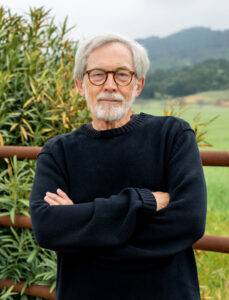
Richard Camp: Taken by photographer daughter Gaby
WITH HIS USUAL APLOMB,
Richard Camp welcomed the Ojai Art Center Theater audience to opening night of “Bless Your Heart.” Then, as the house lights dimmed, he took his designated aisle seat in Row F next to his wife, Ilona Joy Saari. The date was Sept. 6, 2019, and all the theater’s 125 seats were occupied, some of them by old friends of Richard’s who had driven up from L.A. for the play’s world premiere.
The protagonist, loosely based on Richard himself, was a highly educated man of science struggling to come to terms with his mother’s fervent Christian fundamentalism. Richard had been tinkering with two different versions of “Bless Your Heart” for some 20 years. Now, finally, he judged the play ready for prime time. But it still felt weird to bare his fraught family history for the entertainment of strangers.
“Watching a play that you’ve written, about a family dynamic that can be described as ‘I survived,’ was as close to an out of body experience as I’ve ever encountered,” he said in a recent interview. “Was I fair to my mother? Fair to my brothers? Fair to myself? Did I reveal secrets that would be better left alone?”
Beyond these concerns, another question lingered. How would the audience react? They would be the ultimate arbiters of the play’s success or failure.
“Opening night was fraught with emotions as the dialogue in my head shifted from how I felt to how the audiences might feel,” he said. “Ultimately, it became a matter of ‘Let it go.’ Trust the exquisitely talented cast to perform, come hell or high water, and let my life come to life.”
RICHARD CAMP FIRST
came to life in Gastonia, N.C., where he was born on Dec. 16, 1946. His father abandoned the family early on, and eventually a new stepfather moved the family to Madison Heights, Mich., a blue-collar suburb of Detroit.
Richard’s stepfather was a mechanic, a truck driver, a fire-and-brimstone fundamentalist preacher, and a grade-school dropout who saw little value in formal education. He urged Richard to follow his example by dropping out and getting a job. But Richard did not see his stepfather as anyone to emulate. He stayed in school and ended up as class valedictorian.
“I was the first person in my family to graduate from high school,” he said. “I absolutely loved school. Education was a liberating force for me.”
It was there at Madison High School that Richard first caught the theater bug, after being cast in a small role in “A Midsummer Night’s Dream.” He went on to play the lead role in the school’s production of “The Mouse That Roared.” But at the time he had no thought of going on to study acting in college. In fact, he did not think he could afford to go to college at all. But one of his teachers urged him to apply to Rollins College in Winter Park, Fla., where she thought financial aid would be available.
As it turned out, Richard not only was accepted by Rollins, but also by Princeton and the University of Michigan. He couldn’t afford Princeton, which left his choice between Michigan and Rollins.
“I had to get away from home, and Michigan was 45 minutes away and Florida was 45 hours away, so I chose Door No. 2.”
He started out at Rollins as an English major, but soon gravitated to the theater department and was cast in Chekhov’s “Uncle Vanya.”
“And that changed my life,” he said.
Soon he was starring as Fagin in “Oliver!” By now Richard was majoring in drama as well as English, which meant he had to direct a play for his senior thesis. This being 1969, he chose “Hair: The American Tribal Love-Rock Musical,” which he recently had seen on Broadway.
He not only directed it, but he also played Claude, one of the leads. During rehearsals, Richard found himself singing off-key, which led to an alarming discovery: He was losing his hearing in one ear. But the show was a success, so Richard shrugged off the hearing issue and headed to New York to make it as an actor.
BROADWAY DID NOT
immediately put his name in lights, so Richard tried his hand at music with a folk-pop group called Summershine, composed of Rollins students and former students.
“We covered some Simon and Garfunkel, some Carpenters, some John Denver,” he said. “And I wrote several original songs for the group and sang lead on them.”
Summershine did a six-week tour of Europe in the summer of 1970. Upon their return, they performed in Washington, D.C., at a party hosted by a lobbyist who was the father of someone in the group. In the audience that day was Melvin Laird, President Nixon’s secretary of defense. This being the height of the anti-war movement, Richard took the opportunity to tweak Laird by playing the Phil Ochs protest song “Draft Dodger Rag.”
“I sang it directly to him,” Richard said. “He responded by flashing a peace sign afterward. My little contribution to ending the Vietnam War.”
Pivoting back to acting, Richard returned to New York in 1971 to give theater another shot. He honed his skills by joining a series of summer-stock companies in Castleton, Vt., Jackson Hole, Wyo., and Vallejo, Calif.
“
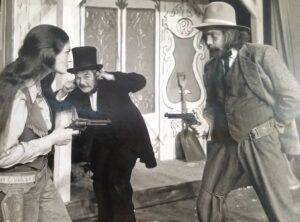
Cat Ballou in Jackson Hole, Wyoming
But the hearing issue was still something I had to deal with,” he said.
Richard was a writer as well as an actor, so he eventually allowed himself to be diverted from acting for the stage to writing for television, where his hearing problem was not an issue.
His long and remarkably varied TV career ranged from writing news stories for ABC’s “World News Tonight” anchors such as Barbara Walters and Frank Reynolds, to co-producing the first season of the reality show “Big Brother,” to producing “Extreme Cuisine” for the Food Network, to writing “50th Anniversary of the Bikini” for the USA Network, to producingdaily reenactments of the O.J. Simpson civil trial for “E! Entertainment Television,” to serving as head writer for ABC’s “The Home Show.” Along the way, he was nominated three times for an Emmy, winning in 1980 as a writer for NBC’s “Hot Hero Sandwich,” which he described as “Saturday Night Live” for teenagers.
At first, Richard did not let his TV jobs completely displace his interest in the theater. He wrote a play called “Cuckoo Birds” that ran briefly at the Vortex, an off-off-Broadway theater; then in 1984 he was one of the writers who worked on “Diamonds,” a musical revue about baseball directed by the legendary Harold Prince. It ran for 104 performances at the prestigious off-Broadway Circle in the Square Theatre.
“It opened on my birthday in December 1984, and closed before baseball’s Opening Day the following spring,” Richard quipped.
Another of Richard’s 1980s projects has enjoyed a much longer run: His marriage to the writer Ilona Joy Saari. They met cute in 1978 while he was head writer for “People,” a TV version of People Magazine. He had written a segment about Greta Garbo which impressed Ilona, and she was looking for a writing partner, so she visited the show’s offices to meet the author.
“She announced, ‘I want to meet the woman who wrote the Garbo piece,’” Richard recalled with a smile.
He introduced himself to her, pointed out that he was in fact a man, and asked her for a date. They became writing partners first, then fell in love and got married. They were preparing to celebrate their 40th anniversary on September 24 as this issue of the Ojai Quarterly went to press.
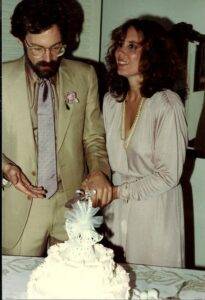
Cutting the Cake at wedding
Ilona is a former rock ‘n’ roll writer, speechwriter, political press secretary, TV and film writer and newspaper essayist. Currently she’s a food blogger, a Huffington Post contributor, an Ojai Quarterly columnist and a mystery novelist. She and Richard moved from New York to Southern California in 1985 and have been here ever since.
They had hoped to start a family, and even though those hopes never came to pass, they did acquire an “unofficial surrogate daughter” due to Ilona’s work tutoring underprivileged children at an L.A. elementary school.
“We both fell in love with one of her students, Alma Hueso, better known as Gaby,” Richard said. “We took her to museums and restaurants and the theater, opening up a wide variety of experiences for her. Ilona taught her to swim, and Ilona’s mom became Gaby’s surrogate grandmother. I was the second person to dance with her at her quinceanera, and when she later married, the ceremony was held at our house, where she asked me to walk her down the aisle. Heartwarming moments, indeed. She is now a successful photographer living in Minnesota.”
TV jobs were plentiful in Hollywood, which kept Richard busy but left him little time for writing plays.
“So I was away from [the theater] for quite a long time, and I really missed it. But TV was paying the bills, so …” Eventually, he started writing plays again, when he could snatch enough time away from his various TV day jobs. “Credo,” starring Jean Smart, was staged at the Odyssey Theatre in West L.A. “Waiting for Garbo” was produced at the Colony Studio Theatre. He also wrote “All My Fathers,” his first attempt at an autobiographical play, and held a few readings of it.
“I was slowly getting back to the theater,” he said. “And then we came to Ojai, ostensibly to retire.”
THE COUPLE
had discovered Ojai while visiting their friends Stuart and Kyle Crowner. Richard and Ilona moved here from Studio City in 2013. As a TV retiree, Richard now had plenty of time to return to his first love, the theater. He had an entree to the local drama scene though Stuart, who was producing plays at the Art Center for Joan Kemper’s Ojai Performing Arts Theater. One of these was Shakespeare’s “Twelfth Night,” directed by Michael Addison, who cast Richard in a small role as a priest. He only had one line, but he was thrilled to be back on stage. It was the first time he had trod the boards in decades.
“I felt comfortable, accepted, as if I’d returned home again,” he said. “Full circle.”
By 2016, Richard had moved up to the director’s chair to helm Peter Shaffer’s farce “Black Comedy.” This play had a special meaning for Richard, who had seen it on a trip to New York in 1967 during his Rollins College days — the first Broadway show he ever took in. Later he acted in it at Rollins, in a production directed by Shaffer himself. Now he chose it as the vehicle for his Ojai directorial debut. It was a major success, and by 2018, Richard had been named artistic director of the Art Center Theater.
His three-year run in that job featured a string of hits, many of which he directed himself. One he didn’t direct was his own “Bless Your Heart.” After moving to Ojai, Richard had dusted off that never-produced “All My Fathers” script and reworked it into a play that is mostly about his relationship with his mother, a poorly educated Christian fundamentalist played by Susan Kelejian. David Nelson Taylor played Thomas, the character loosely based on Richard himself.
Thomas, like Richard in real life, had been born into poverty and ignorance, and used education as his escape route. He wishes his mother had been able to do the same. She, mostly content with her lot, wishes that he would seek consolation in religion, as she does; or that at least he would respect the choices she made in life. To ensure a balanced presentation of these contending viewpoints, the secular agnostic Richard assigned the director’s chair to Tom Eubanks, an Art Center veteran who is an evangelical Christian.
And so we return to Richard sitting in that aisle seat in Row F on that Friday evening in September 2019, as the house lights go down. For the first time, an audience of (mostly) strangers would pass judgment on the play he had spun from the straw that comprised his own life.
“Would audiences react to a story about a poor Southern family with a protagonist who was lifted from the darkness of a stepfather’s stultifying religious absolutism by the healing power of education? I asked all those questions of myself as I wrote … It was terrifying and uplifting at the same time.”
Then the play began. When it ended, the applause assured Richard that he had succeeded.
“The cheering and the standing ovation were more than I could possibly hope for,” he said. “And the remaining 11 standing ovations throughout the entire run made all the heartaches and hard work worth every minute of it.”
Richard’s late mother never had the opportunity to see the play or read the script, but he thinks she would have been touched by the audience’s response. He said she always supported his theatrical endeavors. When she came to see him perform in high school, she brought a script so she could follow along and make sure he got his lines right.
“One little point that was very touching to me,” he said. “At the closing performance of ‘Bless Your Heart,’ unknown to me beforehand and as a surprise to me, Susan Kelejian and the cast had asked J.B. White and other musicians to come on stage and sing ‘I’ll Fly Away,’ which was my mother’s favorite song, and which was sung at her funeral … are you crying yet?”
These days Richard is artistic director at the Ojai Performing Arts Theater, which stages its productions at Matilija Auditorium. Their most recent show was “The Fantasticks.” If all goes as planned, OPAT’s 2024 line-up will include “Lordy Mercy,” a one-man show Richard fashioned from some of the same autobiographical material that underpins “Bless Your Heart.” He will play the part himself, marking his return to the stage in a major role for the first time in almost 50 years.
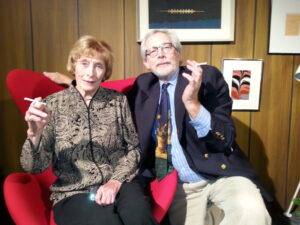 OPAT’s CEO,
OPAT’s CEO,
Joan Kemper, calls “Lordy Mercy” “the funniest show I’ve never seen yet,” according to Richard, who expects that Joan (and others) will get to see him perform it on an Ojai stage sometime soon.
One obstacle in Richard’s way is a recent diagnosis of colorectal cancer. He has already completed radiation treatment and is currently undergoing chemotherapy, and his doctors assure him that things are going well for this highly treatable and often curable disease.
“I’m very confident with what my doctors tell me,” Richard said. “It’s my actor training in me — I listen to the director.”
He’s also confident that his performance won’t be hampered by his impaired hearing, which he has dealt with his entire life. Three years ago, during the pandemic, he decided to get a cochlear implant, which brought about a dramatic improvement.
“It’s a game changer. Remarkable. It bolsters my confidence greatly, in everyday life and in the theater, so I’m looking forward to taking the stage. And besides,” he added, “it’s a one-man show, so I don’t have to worry about dropping cues from other actors!”

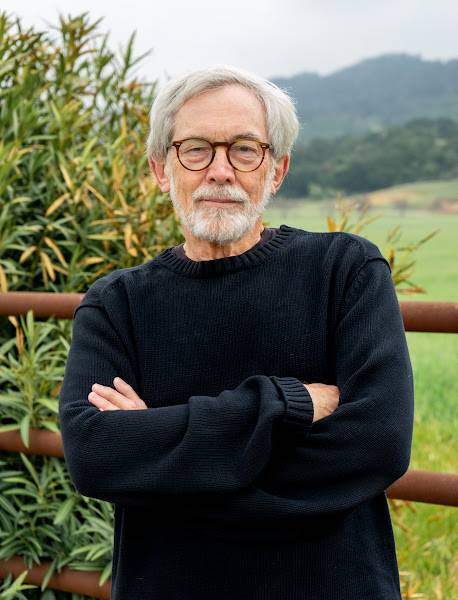
Such an interesting and impressive life and a talented man. Can’t wait for the new play, “Lord Mercy”. Good luck Richard!